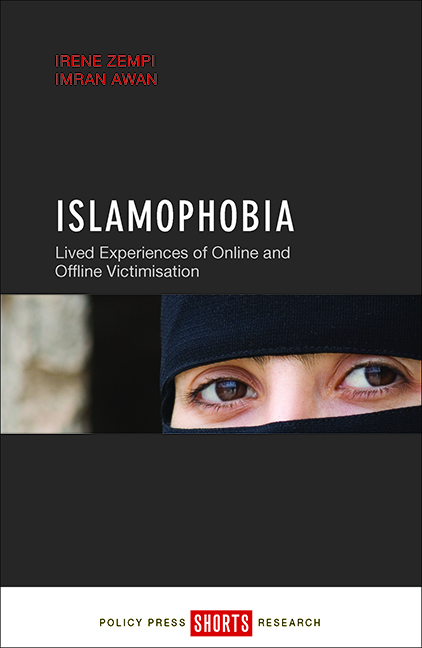Book contents
six - Prevention and responses
Published online by Cambridge University Press: 05 April 2022
Summary
Throughout this study our aim has been victim focused, and as such, the study has been used to empower the people we interviewed by giving them a ‘voice’ and platform whereby they can make suggestions on what should be done to help prevent Islamophobic hate, both online and offline. In particular, our aim was to bring together those who have experienced Islamophobia to collectively share their views, beliefs and attitudes in terms of what recommendations they perceive as being important to them. Listening to those ‘voices’ is crucial if we are to make real change and impact with criminal justice agencies, policy makers and other agencies and stakeholders concerned with Islamophobia. The key points that emerge from our findings is that victims would like better protection on public transport, for the police to have a better recording system for Islamophobia, the media to portray a more balanced viewpoint on Muslim communities, and for Islamophobic hostility in the education system to be addressed. We argue that such measures are important and can be incorporated through better awareness of online and offline Islamophobia, providing training for staff on public transport services and for senior editors in the media to be better informed of the key types of Islamophobic abuse that Muslims suffer, both online and offline. Below are the detailed suggestions and recommendations made by the participants with regards to tackling Islamophobia, both online and offline.
Islamophobia must be challenged from within Muslim communities
Many of the victims we spoke to felt that Islamophobia is not taken seriously, and recommended that the Muslim community itself be much more confident in recognising, reporting and challenging such incidents. They felt that the community itself could provide help and support to victims of Islamophobia. For example, one of our participants, Hafsa stated that “Change needs to come from within the Muslim community. WE must change this”. Other participants expressed similar views, as the following quotes indicate.
‘As a convert to Islam it's an eye opener for me but other people, especially Asians, have experienced this every day in their lives; they had to put up with this their entire lives. Some people are too afraid to speak out about it and say “This is unacceptable” because they feel this is the price they have to pay for living in this country.
- Type
- Chapter
- Information
- IslamophobiaLived Experiences of Online and Offline Victimisation, pp. 69 - 84Publisher: Bristol University PressPrint publication year: 2016



